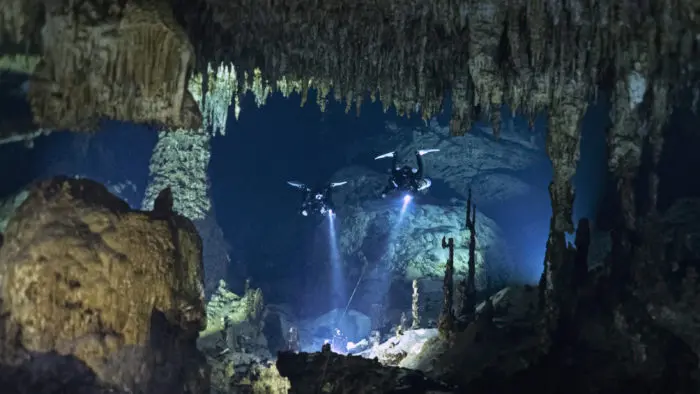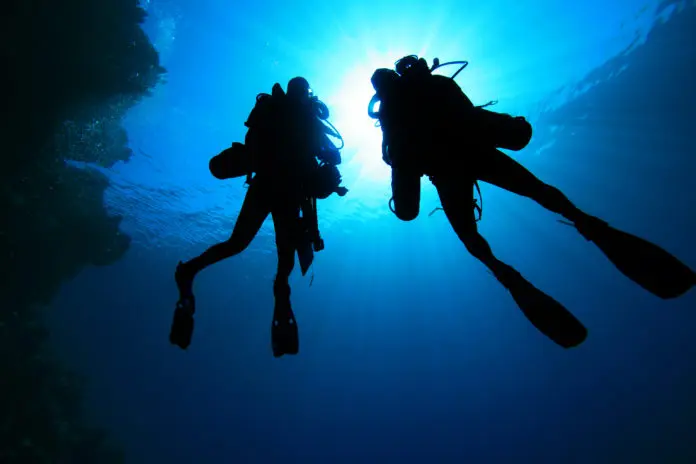I have always been considered an ‘adrenaline junkie’ since I was a child. From learning how to skydive at age 16 to white-water rafting, bungee jumping, riding motorbikes, and even spending weeks living out in the woods using bushcraft skills to survive, whatever activity sounded thrilling or dangerous I was always the first person to sign up! Someone recently said to me though that my love of scuba diving was just another one of my thrill-seeking undertakings, and it made me consider the general classification of scuba diving as an ‘extreme sport’. For various reasons, I would argue the exact opposite. When ‘pushing the envelope’ (as Chuck Yeager, the first human to break the sound barrier, and iconic test pilot would say), I believe that in activities often classed as ‘adrenaline sports’ the elite athletes themselves would say they feel anything but that sensation. Adrenaline can lead to stress, which in turn can lead to panic, which in many instances can be fatal. In my experience, I have always felt that scuba diving has far more in common with yoga or meditation than any death-defying pursuit.
I think it is important to define here what ‘extreme’ actually means. Diving can indeed be as advanced or as simple as you want to make it. A four-hour rebreather cave dive is definitely more ‘extreme’ than a shallow tour around a reef, but I still would not want any sudden bursts of adrenaline on either of those dives. When I’m underwater I want to feel calm and in control. Diving always makes me more relaxed than I ever am on land. From simple single tank dives to long technical dives with copious amounts of equipment, it is important to try and maintain composure, even (or perhaps especially) when things go wrong. I have had total rebreather failures, burst hoses, flooded drysuits in icy waters, been stuck when trying to wriggle my way through too tiny a space in a cave, and yet if I feel even a hint of stress I always repeat the mantra ‘Stop, Breathe, Think, Act’. As long as I can breathe, I can fix the problem. Adrenaline is not helpful or desirable at these times. It is in these instances that it is important to consciously slow your breathing down, and make sure you stay alert yet as calm as possible to minimize any risk of worsening the situation.
One of my favorite examples of staying calm under extreme circumstances comes from a well known British Cave Explorer and Instructor Trainer (who shall remain nameless to protect the guilty!). Whilst exploring the terminal flooded section in Swildons Hole Cave (the famous Wookey Hole water source in the Mendip Hills, Somerset), a gravel slope collapsed behind him, trapping him underwater beyond a tight restriction. It was only his ability to slow his breathing, and therefore his heart rate, which allowed him to stem the initial urge to panic. This ultimately enabled him to retain enough gas to give him the time to free himself. He was able to turn around and dig his way back through the collapsed filled restriction, and then dry cave and sump dive back out of the cave.

One of the ways that some people search for that hit of adrenaline is by trying to set new records. As a possibly controversial question, are scuba diving records a good or bad idea? Depth records, distance records, and time records have all been set over the years, sometimes with terrible consequences. One of the most famous examples was, sadly, one of my greatest inspirations: Sheck Exley. The legendary cave explorer, dive pioneer, and without doubt one of the most influential people in our sport, was one of, if not THE, greatest diver of all time. He wrote the incredible “Basic Cave Diving: A Blueprint for Survival”, the bible for cave divers all over the world. This text details the rules to follow to ensure a safe and enjoyable cave dive. One of his suggestions to limit risk is to avoid excessively deep diving. He made over 4000 safe dives and achieved some of the most astonishing feats ever to be accomplished, but tragically died in 1994 at age just 45 when breaking one of his own cardinal rules: diving excessively deep while trying to break a depth record and continue exploration of a very deep cave he had been steadily working on for many years. Can even our heroes make mistakes? This is of course not to say that there have not been numerous safe record attempts over the years, and anyone who pushes themselves to excel and achieve is only to be admired, but is there a better way to do this rather than the thrill of gaining a new record or trying to ‘beat’ someone else’s?
In my opinion, chasing after diving records or seeking that never-quite-enough buzz from participating in risky endeavors has caused too many accidents and issues over the years. As with any sport, there will always be incidents, but these can be minimized by training and patiently and methodically acquiring experience. The joy of diving does not need to depend on adrenaline. I believe the dive industry should focus its attention on recognizing and celebrating some things that are far more important: education, exploration, and dives with a purpose, whether that be scientific or even just having fun and admiring marine life. Especially if we who love diving want the sport to grow, we need to emphasize its more family-friendly side, for example, the pleasures of clear water, brilliant fish, and, for those with proper training and experience, the fascination and challenge of more advanced and technical diving. While I may always consider myself an ‘adrenaline junkie’, for me scuba diving definitely is not a part of that, and should not be the sport to choose when chasing that rush.

